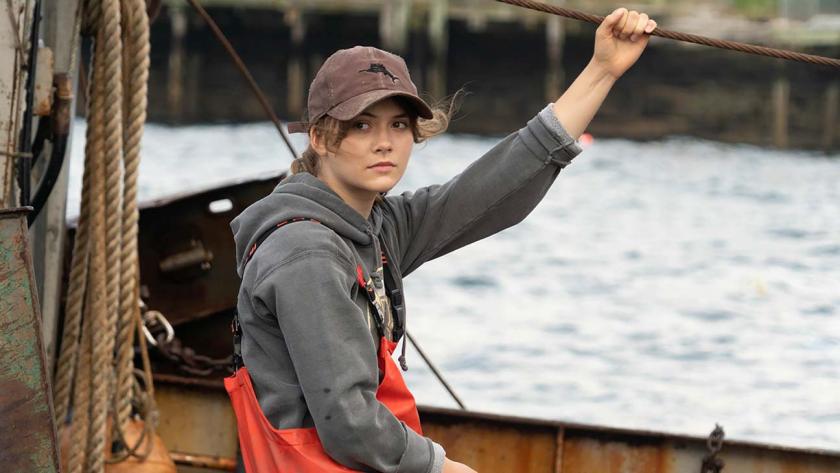When CODA opened Sundance in May, it was an instant hit with that liberal, kindly audience and was snapped up by Disney at great expense. It’s easy to see why – CODA is a funny, easy-to-watch coming of age comedy that allows viewers to feel warm and understanding towards Deaf people. It’s got Oscar nominations written all over it. But I’m curious to see what the Deaf community make of the film. Certainly its American producers have dodged the attacks that the original French version La Famille Bélier received back in 2014 when speaking actors were cast in the roles of Deaf characters. The locale has changed too – the French family were farming folk, their American counterparts live in a working class Massachusetts coastal town and make a living from their fishing trawler.
Emilia Jones plays feisty high-school student Ruby, the only person in her family who can hear. (CODA is the acronym for Child of Deaf Adults). Ruby acts as the interpreter when it comes to haggling over the daily catch with the harbour master and in one very funny scene, translating for her parents at a consultation with a doctor. Ruby is torn between the chance to go away to a prestigious music college and pursue a career as a singer or stay home and carry on translating for her family. It’s great to see Marlee Matlin (below right) who won an Oscar for Children of a Lesser God back in 1986 on screen as Jackie, the sexy mum who is still madly in love with her fisherman husband Frank (below far right), played by the great Deaf stage actor Troy Kotsur. They have a son who works on the boat too and is played by the dynamic young Deaf actor Daniel Durant (below left). There’s some lovely comedy between the brother and sister as they come up with ever more inventive (and disgusting) insults for each other in American Sign Language as well as some very accurate insights into the strains put on the sibling dynamic when one is disabled and the other is not.  But even with great actors in the Deaf roles and an attempt to make a hearing audience experience their perspective by dropping all sound in one scene, this is still very much a film aimed at a hearing audience. The focus is on Ruby, her blossoming romance with a boy in the choir, the mean girls at school who bully her about her weird family and her burgeoning musical career. The charming Mexican actor, Eugenio Derbez plays the high school choir master who encourages Ruby to ‘realise her dream’ - cue lots of hoky singing scenes which will work well for fans of Glee. CODA is not the most original of stories and the director, Sian Heder, a screenwriter for many years on Orange is the New Black, hits all the predictable emotional beats but the film is saved by the high quality of its performers and its sense of place (shades of Manchester by the Sea).
But even with great actors in the Deaf roles and an attempt to make a hearing audience experience their perspective by dropping all sound in one scene, this is still very much a film aimed at a hearing audience. The focus is on Ruby, her blossoming romance with a boy in the choir, the mean girls at school who bully her about her weird family and her burgeoning musical career. The charming Mexican actor, Eugenio Derbez plays the high school choir master who encourages Ruby to ‘realise her dream’ - cue lots of hoky singing scenes which will work well for fans of Glee. CODA is not the most original of stories and the director, Sian Heder, a screenwriter for many years on Orange is the New Black, hits all the predictable emotional beats but the film is saved by the high quality of its performers and its sense of place (shades of Manchester by the Sea).
It just seemed a little baffling that the Deaf family members were so wholly reliant on their hearing daughter to translate ASL on their behalf when texting has been used for at least twenty years to ease communication between Deaf people and the hearing world. Mobile texting is used in the scenes between brother Daniel and his girlfriend, so why not by Ruby’s parents when dealing the hearing world? But if they could communicate for themselves, there’d be no dilemma about leaving home for their daughter; it's a shame that a better plot device couldn't be found. But despite that proviso, CODA is a very enjoyable movie and it would be great if it led to more roles for its great Deaf actors.















Add comment